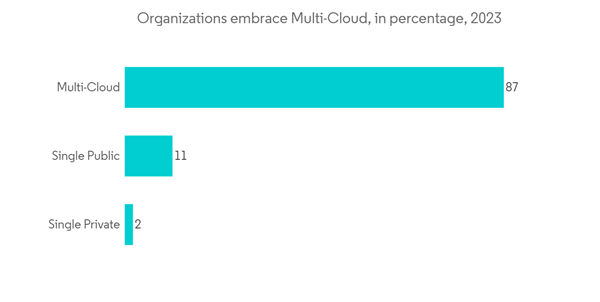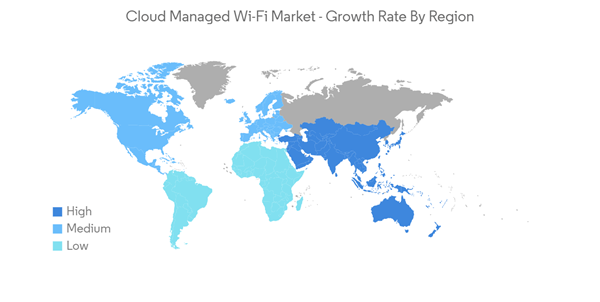Key Highlights
- The rising need for immediate, quicker, and more secure connectivity in the services industry is the primary factor driving the Cloud Managed Wi-Fi Market.
- Cloud-managed Wi-Fi improves network efficiency while assisting with system integration and upgrades. They also oversee networks that let users access hotspots and WLANs on any device, including smartphones, laptops, and PCs. Due to their configuration, dependability, and exceptional cost-effectiveness, Cloud Managed Wi-Fi solutions have become popular among enterprises.
- In addition, the evolving cloud-managed networking market is one of the trends raising the adoption of advanced hybrid cloud models in managed networking services. Hybrid Cloud managed networking provides advanced features such as secure network infrastructure, connectivity, and advanced business models, along with eliminating third-party participation.
- Cloud-based solutions offer advanced analytics and insights, helping organizations optimize network performance, troubleshoot issues, and make data-driven decisions. Integration with other cloud services and platforms, such as CRM and marketing tools, offers improved customer engagement and data-driven marketing opportunities.
- In addition, storing network data and configurations in the Cloud raises security concerns, as it becomes a potential target for cyberattacks. Ensuring robust security measures is crucial. Also, dependence on cloud services means that network availability relies on the stability and uptime of cloud providers. Downtime or disruptions can affect connectivity.
- The COVID-19 pandemic had a significant impact on the cloud-managed Wi-Fi market. As more businesses adapted to remote work and digital transformation, the demand for reliable and scalable Wi-Fi solutions increased.
Cloud-Managed Wi-Fi Market Trends
Development of Wi-Fi 6 to enhance the growth of a service model across various industries
- Cloud-managed Wi-Fi 6 technology offers improved performance and efficiency, making it a popular choice for businesses and organizations looking to enhance their wireless networks. It provides faster speeds, better support for a large number of devices, and increased security features.
- Moreover, with the growth of bandwidth-intensive applications like video streaming, online gaming, and augmented reality, there's a need for Wi-Fi networks that can deliver high-speed, low-latency connections. Businesses and organizations require robust and scalable Wi-Fi solutions that can be centrally managed. Cloud-managed Wi-Fi 6 systems offer centralized control, monitoring, and troubleshooting capabilities, making them attractive for enterprises.
- In addition to this, the service providers can continuously monitor the performance of their Customer Premises Equipment with Wi-Fi 6 and verify the customer's service level remotely. Large enterprises are anticipated to have a requirement for high-quality Wi-Fi services in the upcoming years due to a surge in data consumption by many business applications.
- However, the growing proliferation and widespread adoption of public Wi-Fi networks in various businesses and commercial settings present a lucrative opportunity for enterprises to leverage Wi-Fi 6 technology. As the demand for seamless connectivity and high-speed internet continues to rise, businesses recognize the need to cater to their customers with reliable, efficient, and secure wireless networks. This further augments the market's growth.
- In May 2022, Nokia introduced the Nokia DAC Wi-Fi to provide more flexibility for several industries connecting assets as part of their digital transformation. Moreover, in the Nokia Digital Automation Cloud (DAC) end-to-end industrial-grade digitalization platform, the Wi-Fi connectivity solution will be easily available.
Asia-Pacific is Expected to Have the Fastest Growth Rate
- As more people in the Asia-Pacific region gain access to the internet, the demand for reliable and high-speed Wi-Fi connectivity has risen, driving the need for cloud-managed Wi-Fi solutions. Moreover, many businesses in the region are undergoing digital transformation, often requiring modern, scalable, and centrally managed Wi-Fi infrastructure.
- The Asia-Pacific region for its high-tech infrastructure and reliability standards. Cloud-managed Wi-Fi offers robust, redundant, and scalable networks, ensuring uninterrupted connectivity. Also, businesses often require scalable solutions to accommodate fluctuating demands. Cloud-managed Wi-Fi can quickly scale up or down, making it suitable for companies of all sizes.
- In December 2022, as part of the Digital New Deal 2.0 initiative, the Ministry of Science and ICT declared a pan-government strategy on metaverse. This strategy will assist South Korea to respond better to disruptive innovation and emerging new technologies and be prepared for the future. This is expected to enhance the market's growth within the region exponentially.
- More than 22 countries have adopted the operation of Wi-Fi 6E systems using the 6 GHz band, and Japan now joins the countries committed to delivering this latest Wi-Fi innovation. As of September 2022, Qualcomm will enable Japan with a Complete Wi-Fi 6E Ecosystem as the Country Opens 6 GHz Band, which will dramatically improve the congested environment in Japan.
- Overall, the cloud-managed Wi-Fi market in the Asia-Pacific region is poised for growth due to its ability to meet the evolving needs of businesses and organizations in an increasingly connected world.
Cloud-Managed Wi-Fi Industry Overview
The cloud-managed Wi-Fi market is currently characterized by moderate consolidation and features several prominent players. A handful of these major players command significant market share. Furthermore, the market is experiencing a flurry of activity with mergers, acquisitions, and substantial investments undertaken by key industry participants, all in a concerted effort to enhance their business operations and extend their reach to cater to diverse customer needs across various applications.In November 2022, 11:11 Systems, a provider of managed infrastructure solutions, announced the successful completion of its acquisition of Sungard Availability Services' Recovery Services business and Sungard AS' Cloud and Managed Services (CMS) business.
In January 2022, Linksys unveiled the Wi-Fi 6 Cloud Managed Access Point, specifically designed for areas requiring robust support for a multitude of concurrent client connections. These Wi-Fi 6 Cloud-managed access points are equipped with 4x4 antennas, which significantly enhance both security and speed. The cloud-based control plane facilitates seamless ZeroTouch provisioning, efficient configuration management, and streamlined monitoring, all powered by a cloud-native operating system running on the units.
Additional Benefits:
- The market estimate (ME) sheet in Excel format
- 3 months of analyst support
This product will be delivered within 2 business days.










